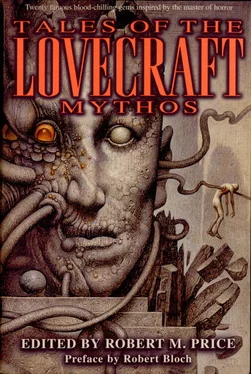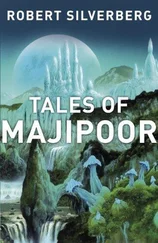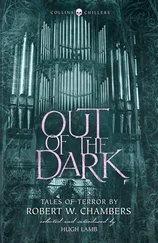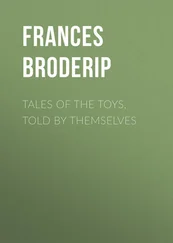Miss Rhodes came into Cadogan Square. Here she suddenly stopped, threw back her head and screamed….
The Horror out of Lovecraft
DONALD A. WOLLHEIM
“Oh my Gawd, my Gawd,” the voice choked out. “It’s ago’n agin, an this time by day! It’s aout an’ a-movin this very minute, an’ only the Lord knows when it’ll be on us all!”
— H. P. Lovecraft
I do not know what strange thing came over me when I determined on my investigation of the mysterious doings of Eliphas Snodgrass that winter in ’39. There are things that it is better no man know, and there are mysteries that should remain forever hidden from mortal knowledge. The whereabouts of Eliphas Snodgrass during the autumn of ’39, and the ensuing winter, are among these things. Would that I had had the stamina to restrain my curiosity.
I first heard of Eliphas Snodgrass when I was visiting my aunt Eulalia Barker, at her home in East Arkham, in the back districts of Massachusetts. A forgotten terrain, dark and somber, it was a region amongst the oldest in America, not only in the origin of its white settlers (it was settled by several boatloads of surly bondsmen brought over on the packet Nancy B . in 1647, commanded by the time-befogged Captain Hugh Quinge, about whom little is known save that it is believed that he was part Hindoo and that he married an Irish girl from Cork under mysterious circumstances), but in other elder traditions. My maiden-aunt Eulalia was a pleasant enough spinster — she was related to me on my mother’s side, mother being a Barker from Bowser, a little, scarce-known fishing town.
Eulalia (she had moved from Bowser suddenly, many years ago, under circumstances which were never made clear) had struck up a passing acquaintance with the Snodgrass family, who occupied the sedate old Crombleigh mansion on the other side of West Arkham.
How she happened to meet Mrs. Snodgrass, she was seemingly reticent to discuss.
Nonetheless, I had been staying at her house while pursuing my studies in the famous library at Miskatonic University, located in Arkham, but a scant three weeks before she mentioned Eliphas Snodgrass. She spoke of him to me in a troubled tone; she seemed reluctant to do so, but confessed that Eliphas’ mother (who must have had Asiatic blood several generations back) had asked her to communicate to me her worries. As I was known to them for my scholarly research in the realm of the ancient mythologies, she knew me as a scholar. It seemed that Eliphas Snodgrass had been acting oddly. This was not new, as I learned later; it was only that his oddness had taken a curiously disturbing turn.
Eliphas Snodgrass, as I learned from my aunt and from other subsequent investigations, was a young man of about 27 — tall, thin, gaunt, rather stark of countenance, vaguely swarthy (probably an inheritance from his father, Hezekiah Snodgrass, who was reputed to have African blood on his mother’s side, six generations removed) and was given to long spells of brooding. At other times, he would be normal and almost cheerful (as much so as any other Arkham youth) but there were periods when, for weeks at a stretch, he would lock himself away in his chambers and remain grimly quiet. Occasionally strange noises could be heard issuing from his rooms — weird singing and odd conversations. Once in a while, the house would be thrown into a paroxysm of terror by unearthly screeches and a howling that would usually be cut off short in a manner dreadful to contemplate. When queried as to the nature of these noises, Eliphas would turn coldly, and, fixing the inquirer with a chilly stare, mumble something about trouble with his radio.
Naturally, you will understand how grimly disturbing these things were. And, since I owed my aunt Eulalia a debt which I dare not explain here, I felt it incumbent upon me to make a brief inquiry into Eliphas’ doings. I secured entry to the Snodgrass mansion by means of my aunt, who invited me to accompany her on a social call.
I had not set foot in the house one minute before I sensed the strange, brooding aspect of it. There seemed a closeness in the air, a feeling of tense expectancy as if something, I know not what, were waiting — waiting for a moment to strike. A curious smell seemed to waft into my nostrils — an odd stench as of something musty and long dead. I felt troubled.
Eliphas came in shortly after I had arrived. He had been out somewhere — he did not vouchsafe where — and it seemed to me that his shoes were curiously dirtied, as if he had been digging deep into the dusty soil; his hair was curiously disarranged. He spoke to me civilly enough and was sharply interested when he heard that I was studying at Miskatonic University. He asked me animatedly whether or not I had heard of the famous copy of the Necronomicon by the mad Arab, Abdul Alhazred, which is one of the most prized possessions of the University. I was forced to reply in the negative, at which he seemed oddly displeased. For a moment, I thought he was going to leave abruptly, but then he checked himself, made an odd motion in the air with the thumb and forefinger of his left hand, and started discussing the singular weather we had been having.
It had started by being an unusually hot summer, but a few days ago the weather had changed suddenly to a curious dry chill. At night a wind would arise which seemed to sweep down from the hills beyond Arkham, bearing with it an odd fishy stench. Most of the old- timers remarked on its oddness, and one or two compared it to the strange wind of the Dark Day of 1875, about which they failed to elucidate.
I saw Eliphas Snodgrass several times more that summer, and each time he seemed more preoccupied and strange than before. At one time he cornered me and begged me to try to borrow the volume of Alhazred from the library for him. He had been refused access to it by the librarian, a most learned man who evidently made it a practice to refuse consultation with that book, and others of similar ilk, to persons of a certain nervous type.
I well remember the night of September 10th. It had started out as a typical hot day of late summer; toward evening it grew chill, and, as the sun set, a high wind sprang up. Dark clouds seemed to arise out of nowhere and very shortly a gale was blowing down from the hills and lightning was crackling far in the distance.
Along about twelve o’clock, a curious lull occurred which lasted for about ten minutes. I recall it well for at that moment a stench of mustiness seeped into the town, drenching every house and person. I had been reading late and I stopped as the smell assailed me, and realization that the storm had ceased came to me. I stepped to the window, pulled up the shades, and stared out.
Outside, the sky was a dead black. There was a pregnant stillness in the air, and a thin, miasmatic mist hung all about. Then like a bolt from the blue there came a terrific clap of thunder and with it a startling green flash of lightning which seemed to strike somewhere in Arkham and linger. I remember being amazed at the fact that I had heard the thunder before seeing the lightning, rather than after.
Immediately after this remarkable phenomenon, the storm broke out in renewed fury and continued several more hours.
I was awakened in the morning by the insistent ringing of the telephone. My aunt, who answered it, knocked on the door shortly after and bade me dress. It seemed that it was the Crombleigh house that had been the resting point of the odd lightning. Nothing was damaged, but Eliphas Snodgrass was missing.
I rushed over. As I neared the house, I could sense the smell, and upon crossing the threshold, I was virtually bowled over by the odor of dead and decaying fish which permeated the place. The stench had come when the lightning struck, Mrs. Snodgrass told me, and they were trying desperately to air it out. It had been much worse than it was now.
Читать дальше












